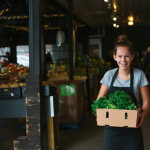During this global crisis there have been businesses that are in the right place at the right time, those who are in the wrong place at the wrong time, and those who are fast to innovate and capture the market needs.
With many businesses in difficulty it can be difficult to look past the stresses and the conventions of the ‘way it was always done’, but there are opportunities that will help businesses get through this tough time, but also reinventing for longevity and prosperity.
I know this for myself, after a massive personal crisis and having to reinvent myself too. We’re seeing a massive spike in innovations right now across the globe and many are exciting and inspiring and even impacting the framework of society.
It is time to celebrate those and to challenge us all to innovate beyond just moving to a Zoom video meeting or dinner for two, but to find some really clever ways to make life better for the world too.
Those in the right place at the right time could be the likes of Uber Eats and Deliveroo who are making the restaurant industry remain relevant when otherwise they’d be certain to close.
Despite this need being filled, the public are calling out for less capitalist greed from these businesses who are appearing to be opportunistic, as noted by a recent petition for these businesses to cut their excessive margins.
This is saying that whatever we’re doing right now in business, an element of consciousness and respect for the wider community is a must. Thank goodness – an early uptake of conscious capitalism may be here?
There are those also who are being creative at hanging on to their people, knowing that this is just a temporary storm to ride out.
Innovative people hiring platform BenchOn is allowing businesses who are unable to keep their people working to put them up for sub-contracting to other businesses in need of temporary overflow staff in a shared value model of harmony. Setting the example is Qantas serving their people to Woolworths, as we speak, in a wonderful collaboration to keep their people employed until business resumes.
There are businesses that are in the wrong place when the luxury goods market is the last thing on anyone’s mind. French perfume manufacturers and alcohol distilleries (including one owned by Aussie cricketer, Shayne Warne) is fully aware that their industry will be impacted with people buckling in their spending in order to focus on survival.
By moving their manufacturing plant temporarily to hand sanitizer the businesses remain liquid, but also are filling an important and appreciated need that will not last forever either. This is conscious behaviour, and the speed to adopt this change was certainly commendable and a factor in their successes too.
Zoom and other webinar format technologies are booming at present with many businesses switching their meetings to online, but also many businesses shifting to online education programs using video conferencing technologies to create and record content.
Education platforms like Yarno, Podia, and Learnify are other examples of being in the right place at the right time enabling other businesses to innovate their service offering. Likewise those who want to expand on their WordPress system can add the plug in Learn-Dash to advance and innovate their existing technology stack.
Businesses such as Netflix Party and Instagram had innovations in the pipeline that all of a sudden are filling an important need more than ever with their group watching or Co-Watching video chat platforms which will no doubt see an unprecedented launch result. These apps allow a group of users to watch together and consume all feed content together and could not be better timed.
Manufacturers of clothing are quickly switching to produce medical wear, not just to fill an urgent need, but a timely sales decision. Where disposable hospital gowns used to be the norm, the rate of use is too high to keep up with so the reinstatement of cloth gowns with a laundry service is an innovation by going backwards in the way the hospitals work.
This shift backward allows for the volumes to be met (and perhaps also more sustainable too). Those who have been stock-piling their disposable gowns have an innovation available to them, according to International Infection Control Consultant, Glenys Harrington. The innovative handling process to re-purpose these usually disposable gowns is available by treating in a customised process with UV light sterilisation. Sometimes the innovation is not forward thinking, but rear-ward.
Hotels are about to be re-purposed for hospitals with secure and comfortable conditions for virus patients, where they can successfully be quarantined. There are many hotels that would otherwise remain completely empty. No doubt there is work to be done to manage infection control, in room services and cleaning protocols but nothing that a specialist in care for these patients couldn’t innovate.
Innovations of necessity are coming out of restaurants and cafe’s with online cooking experiences with fans all cooking the same dish simultaneously and sharing a meal together over video conferencing or video hangout technology.
There may even be a new genre of food experiences and games out of this. Restaurants are ramping up their take away menus, changing the type of food and meal sizes on their menus, and even shifting to a membership model to get some funds on board from loyal fans when it is really needed.
There are also those who think they are doing something good for the world by doing things differently, yet could be doing as much harm as the good they intend. With Coca Cola announcing it was repurposing their advertising budgets to help those out of work because of the virus, they have likely inadvertently sent a massive part of the creative and media industries to be put out of work in the process. The advertising and media spend is multi-billion dollar value and that’s a lot of well employed advertising and marketing people who rely on this. It is an instance like this where the decision to innovate was well meaning but potentially short-sighted, knee-jerk, and possibly mis-guided despite best intentions.
A real innovation could have been to engage the people in the industry to maintain their jobs but be engaged to do something that had an even greater impact on the world using creativity and harnessing the talents of some of the most needed people in the world right now – creative people.
Many businesses are being creative about how they do their corporate social responsibility too – and that’s well needed in a time of need too.
Innovations can come from creative thinking at every stage of the business process from business design, HR and re-hiring policies, brand purpose and aligning decisions in a congruent fashion, brand strategy, media placement and strategy, production development and offer design, new technologies, new ways of using old technologies, new ways of managing operations and customers, and new ways of engaging audiences until the regular way of doing business resumes.
Personally, I don’t want the old world to come back completely, although I don’t want anyone to suffer because of this. There are many changes that are for the better.
Some social activists are even saying that democracy will change forever and are hopeful this is for the better for us all too. There are many initiatives that have been sitting in the wings in parliaments around the world that many have been struggling to have heard, but right now they may be having an opportunity to add value and make permanent change. This is innovation in our infrastructure and the operating framework of society too.
As an innovator my entire career, with always the next new and more efficient way of doing things, I’ve been unpopular much of my career. I know that innovation comes at a great personal cost but strove on anyway because I knew it was better for the long term.
Much of these innovations scoffed at by the industry are now commonplace, like digital film production, in-house studios, in-house editing facilities and multi-talented teams (rather than siloed teams) and even these last two years with a totally new industry business model. Now is the time that innovation is accepted more than ever, and a welcome addition to our society in need. Those of us with creativity as our core driver, and that sense of wanting things to be better, are totally thriving in our element in this climate. I could go so far as to say that creativity thrives in constraint and difficulty.
The most important attribute that is needed right now to stay ahead and stay afloat is our mindset. We need to be accepting of the traumatic turn of events, allow ourselves to feel the stresses for a finite amount of time and then kick into a mode of innovation and ‘can do’ attitude to make the best of this situation.
After having all my life savings put behind a technology I was building and to have the entire thing wiped over by a careless technologist (including the three back ups failing too); I know first-hand how important it is to innovate – and to do it fast.
Ironically for me, and for many others too, I know that sometimes these mistakes are the best thing that can happen to us (with the gift of hindsight that is). This may not feel good in the beginning, but there can be successes through innovative survival tactics, and also by innovating to meet market needs or creating a new future. The trick seems to be to respect the challenges that many are facing and to pool together to do something to help each other out as best we can, and make sure that you are not purely profit-focused, as has been accused of Uber Eats and Deliveroo right now.












